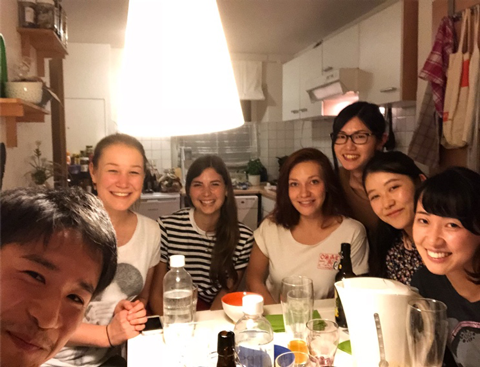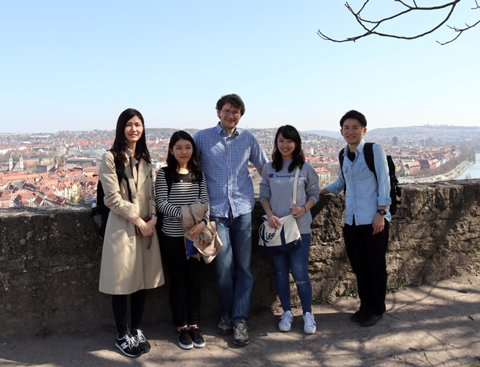International and Domestic exchange
Misa Shimizu (6th grade)
After completing his training at the University of Würzburg
I did my clinical training at Julius-Maximilians-Universität Würzburg in Bavaria, Germany from April 1st to April 29th, 2018. The reason I participated in this program was because I had studied abroad in Germany as a high school student and thought it would be an opportunity to utilize that experience, and because I wanted to broaden my horizons by learning not only about medical care in Japan, but also about medical care overseas and the differences between Japan and Japan. I also thought that by experiencing various things while I was a student, I would be able to have a flexible way of thinking and ideas, and also develop a spirit of challenge in a new place. At first, I was very worried about the language barrier and about my first hospital training abroad, but I received a lot of support from the people in my hometown and was able to spend a very fulfilling month.
The training period consisted of three days in psychiatry, one week in anesthesiology, and two weeks in nuclear medicine. First, during the training in psychiatry, I was able to observe counseling and therapy under one doctor. The training here involved a lot of verbal communication, and was all conducted in German. Since I only knew conversational German, I asked a lot of questions about medical terms, but they explained them carefully each time without a single complaint. I was surprised that the ward where I was training did not have patients with serious symptoms, and the environment was much more free than in Japan, with no curtains separating the beds next to each other in the room and people being free to go for walks in the nearby park. There were also many types of therapy that patients could participate in voluntarily, and there were many ways to change the mood of patients who had been hospitalized for a long time, such as music therapy, art therapy, and exercise therapy.
During my anesthesiology training, I participated in electroconvulsive therapy in psychiatry, surgery in obstetrics and gynecology, orthopedic surgery, ophthalmology, cardiovascular surgery, etc., following my doctor. This time, I asked my doctor to explain things in English, but he said he would do it in German if he understood even a little German, so on the first day I was desperate to remember the names of machines, tools, and medicines in German. However, he said that he would explain anything I didn't understand as many times as I wanted, so I was able to train with peace of mind. During my training, I was surprised to learn that there are nurses in Germany who are qualified in anesthesiology and who can administer anesthesia if the doctor specifies the amount. Also, in Japan, trainees do not have the opportunity to take the route of patients before surgery or set up and prepare ventilation, but I was shocked to hear that in Germany, it is common for students who come to train to do so. When I said that I had never taken the route of patients in Japan, I was told that I should practice, and I was given the opportunity to take the route about 10 times in a week with the help of doctors and nurses. I made a few mistakes, but the doctor followed up and the patient seemed to have no qualms about a student performing a medical procedure, and kindly supported me. What I felt was that the environment in which they extended a helping hand to a foreign student who they had never met before, despite the anxiety before surgery, must be due to the custom of training all medical professionals together. When I actually asked, I found that by the sixth year, most blood sampling and interviews were done by students, and the patients who came to the university hospital seemed to recognize this as a given. Rather, I felt that they were training doctors who could be immediately put to work, as they said that if they didn't practice as students, they would not be able to do anything at first even after becoming a doctor, and that they didn't think that was a good thing. And in addition to the route, I had a lot of experience with every surgery, from preparing mask ventilation to setting the ventilator, inserting a laryngeal mask and intubating once, removing the tube, changing the IV drip, and waking the patient up from anesthesia. It was my first time doing all of these things, and I was confused, so they used gestures to explain things I didn't understand, and they also gave me very careful instruction on important things for intraoperative management and how to write anesthesia records. In addition, there was another difference from Japan that surprised me. In many cases, operating rooms are separate for each department, and although it varies by department, they are thorough in ensuring cleanliness when changing into operating clothes. In the strictest places, you cannot enter the room where the operating clothes are kept in the clothes you were wearing, so you have to take off all your casual clothes and shoes before entering a separate room next door, changing into shoes for the operating room, and putting on operating clothes. I felt that this was different. Also, in some departments, you had to change into operating clothes every time you went to the toilet. Most of my week in the anesthesiology department was my first experience, and I was constantly overwhelmed.
In the nuclear medicine training, I was not assigned to a fixed teacher, but instead practiced what I wanted to do and what I wanted to see each day. During these two weeks, I was given explanations in English, and since there was a Japanese teacher, I was trained in Japanese. Here, I was told that I could look at anything I wanted, such as research, clinical practice, and images, and I spent a lot of time looking at images. I was able to see many things, such as PET/CT, thyroid ultrasound, myocardial SPECT, and bone scintigraphy. On the second day, a Japanese student was brought in by ambulance, so I was asked to look at him, and I was able to observe from the initial response to the emergency to the examination and hospitalization as an attendant and interpreter. There, I learned that there is a position that only requires moving a bed from the room to the examination room. I was also surprised that everyone, including doctors and nurses, spoke to me in German at first, even if they were obviously foreigners. After that, most of them switched to English when they found out that I couldn't speak German, which was very strange for me, as I always prepare myself to speak English when I see a foreigner in Japan. Later, when I had lectures with German students or met students who were doing internships, they would first speak to me in German, and I realized that because many people from foreign countries come to German universities and they can speak German, even if they are foreigners, they can speak German to me. I did internships with Japanese teachers for most of the remaining days. In the first week, I was taught about the history of the University of Würzburg, the differences between the medical systems in Japan and Germany, and the differences in professor selection and education. After the OSCI ended in the third year, I was able to attend classes while doing internships, work part-time to help with surgeries in my free time, and the last four months of the sixth year were the most surprising thing for me, as I was able to freely choose the department I wanted to do in. In the second week, I was also taught about PMSA image analysis of prostate cancer and DOTA-TATE. The professor of nuclear medicine taught me how to read various images, but because it was in English, I was so busy trying to understand that I couldn't ask many questions, so I thought I should have mastered basic medical English vocabulary more.
After the training and on weekends, I went out to eat or traveled with German students and teachers, and students from Nagasaki, and discovered many new things. It was refreshing to learn not only about medicine, but also about the differences in thinking between Japan and Germany, and to hear about German people's impressions of Japanese people. Germans have a culture of saying YES or NO clearly, and Japanese people seem to be aware that they do not say no very clearly when they do not like something. When I told them I enjoyed my meal, they often asked me, half jokingly, if that was my honest opinion. And above all, I felt that the plate of rice was very large and that most dishes came with a lot of potatoes, which was very German. In addition, with the exception of some restaurants and cafes, most stores are closed on Sundays, and most stores close at 7 or 8 p.m. on weekdays, and there are no 24-hour convenience stores, so I felt that people in Germany spend their time more leisurely than in Japan, where people work long hours. Furthermore, I felt that the presentation skills, self-assertiveness, and negotiation skills of Germans are very good. I was very surprised that even the place where you work as a doctor is decided through negotiation.
Through this study abroad experience, I realized the importance of speaking up more proactively, not just being passive, but participating actively, and having my own opinions. I also realized that the internship allows you to learn and acquire skills by enjoying doing something on your own. I would like to make use of these four weeks of experience in my future. Finally, I would like to thank Professor Furuse, Mr. Torii from the International Exchange Center, Professor Stahl, Professor Geier, Professor Buck, Professor Higuchi, Professor Fukushima, Professor Moll, my tutor Anna, and all the other people who supported me during the internship, for giving me this wonderful opportunity. Thank you very much.

